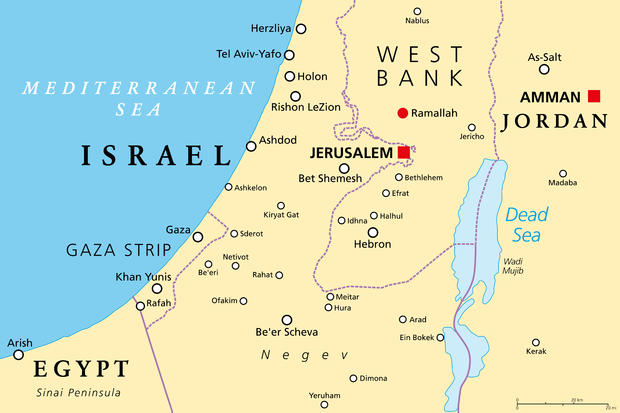El-Arish, Egypt — The U.S. plans to help establish a field hospital inside the war-torn Gaza Strip for civilians wounded amid the conflict between Israel and Hamas, the U.S. Agency for International Development announced Tuesday. USAID Administrator Samantha Power made the announcement — part of a new $21 million aid pledge for Gaza and the West Bank — as she arrived on a U.S. military plane carrying humanitarian supplies that flew into Egypt on the 60th day of the war, which looked set to expand after a brief cease-fire.
The plane — the second military flight to deliver U.S. humanitarian assistance for Gaza since the conflict was sparked by Hamas’ brutal Oct. 7 terror attack on Israel — ferried some 36,000 pounds of food and medical supplies to the northeast Egyptian city of El-Arish, about 30 miles from the Rafah border crossing into Gaza.
It was not immediately clear when USAID hoped the new field hospital would be up and running, what other nations or organizations were helping to fund it, or exactly where in Gaza it would be located. The agency told CBS News it would be staffed by personnel from nongovernmental organizations working in partnership with the U.S. government.
Following the collapse of a week-long cease-fire in Gaza that saw Hamas free dozens of Israeli hostages in exchange for the release of more than 200 Palestinian prisoners, the Israeli military has expanded its ground and air operations in the Palestinian territory this week. It’s focused in recent days around the southern Gaza city of Khan Younis, home of Hamas leader Yahya Sinwar.
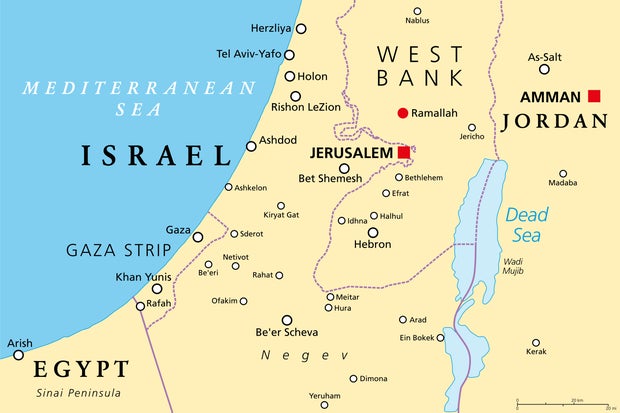
CBS News correspondent Charlie D’Agata reported on Tuesday, however, that even Rafah has been hit by Israeli airstrikes this week. In the far south of Gaza, Rafah is one of the places that the Israeli army had for weeks urged Gazan civilians to flee for their safety, as it pounded the northern part of the territory.
- Israel publishes map of “evacuation zones” in Gaza as airstrikes resume
Officials in Hamas-run Gaza and from international aid organizations say the territory’s health care infrastructure has been largely rendered unusable by Israel’s airstrikes and limited fuel supplies. Daily images from Gaza’s packed hospitals show staff frantically trying to treat people wounded by strikes, many of them children, in corridors and on blood-stained floors.
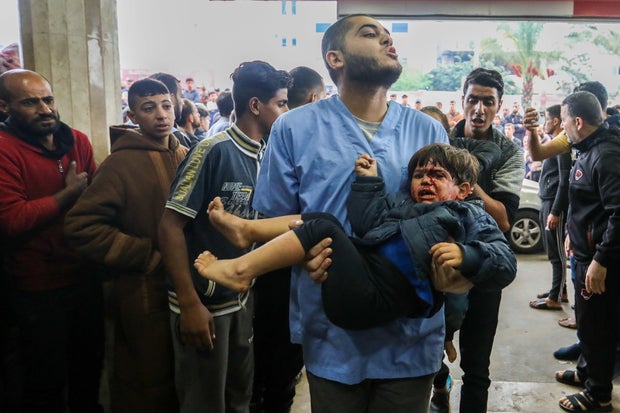
Ahmad Hasaballah/Getty
U.S. officials have emphasized over the past few weeks the importance of protecting civilians in Gaza amid Israel’s offensive. The Ministry of Health in Hamas-run Gaza said Monday that almost 16,000 people — 70% of them women and children — had been killed in Gaza since Israel began its military operation, with which it has vowed to “destroy Hamas.”
Officials from Hamas, which has long been designated a terror group by the U.S., Israel and many other nations, do not differentiate between civilian and militant deaths.
National Security Council spokesman John Kirby told “Face the Nation” on Sunday that the U.S. did not know how many civilians had died in Gaza, but “clearly many thousands have been killed, and many more thousands have been wounded, and now more than a million are internally displaced.”
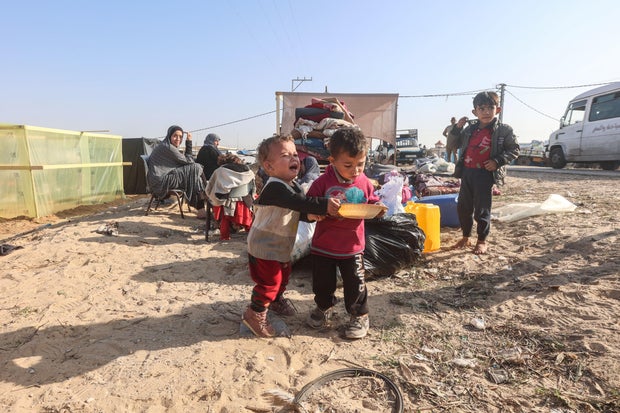
Ahmed Zakot/SOPA Images/LightRocket/Getty
In Israeli government spokesperson told reporters Tuesday that his country was open to “constructive criticism” on how to reduce harm to civilians in Gaza, but that it would continue with its mission to destroy Hamas. Spokesperson Ilon Levy said Israel expected “hard fighting in the second phase of its war,” which he said was underway and would be “difficult from a military point of view.”
Promise of more U.S. humanitarian aid for Gaza
Power said USAID would provide an additional $21 million in aid for Palestinians in Gaza and the Israeli-occupied West Bank, boosting the $100 million in assistance already pledged by President Biden in October.
The first U.S. military flight with aid for Gaza arrived in Egypt last week, bringing more than 54,000 pounds of supplies. According to USAID, the assistance included medical supplies to support the health system in Gaza and ready-to-use foods.
“Combined, these flights alone have brought more than 90,000 pounds of humanitarian commodities to the civilians in Gaza with a third flight scheduled to soon follow,” USAID said in a Tuesday statement. “In addition, the United States has also organized five non-military flights over the past two weeks that have brought in more than 500,000 pounds of U.S.-purchased emergency food assistance.”
USAID estimates that 1.7 million people have been internally displaced in Gaza, the much smaller of the two Palestinian territories, and 2.2 million are in need of humanitarian assistance because of the war.
The Pentagon said the U.S. military would transfer the supplies to international agencies that would complete the delivery into Gaza.
Egypt says Israel “hindering the flow of aid”
El-Arish, in Egypt’s Sinai Peninsula, is about 28 miles west of the Rafah border crossing with Gaza — the only entry point to the Palestinian territory not completely controlled by Israel.
For weeks, hundreds of trucks packed with humanitarian aid from many nations have lined the roadside, waiting to cross into the Palestinian enclave at Rafah.
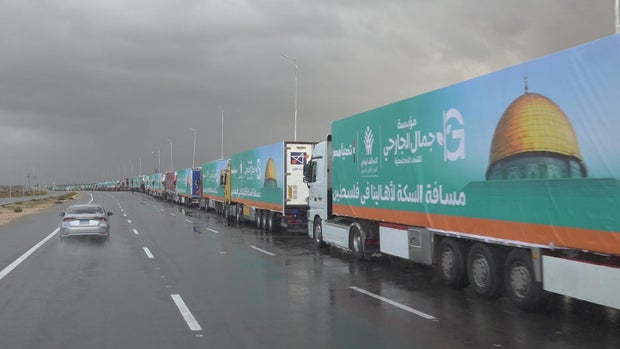
CBS News
“Egypt is always ready to send more aid through the Rafah crossing, but Israel is hindering the flow of aid,” Ayman Walash, the director of the Egyptian government’s Foreign Press Center, told CBS News. “The way Israel inspects aid trucks after they cross seems to be deliberately delaying it.”
Walash, as an example of the slow processing, said that on Sunday, “79 trucks crossed from Rafah into Gaza, but were then driven about 30 miles south into Israel, where they were “waiting to be inspected by the Israeli authorities at Al-Ouga (Nitzana) border crossing.”
He said some 230 more trucks “were ready at the Egyptian gate and were left waiting for the green light from the Israeli side to cross.”
Walash said about 70% of the total aid delivered to Gaza thus far had been provided by Egypt.
From October 21 to December 3 about 3,109 aid trucks entered Gaza from the Rafah crossing, including 3,268 tons of medicine and other medical supplies, 1,648 tons of fuel, 15,609 tons of food and 11,724 tons of water.
Ahmed Shawkat
Ahmed Shawkat is a CBS News producer based in Cairo.
